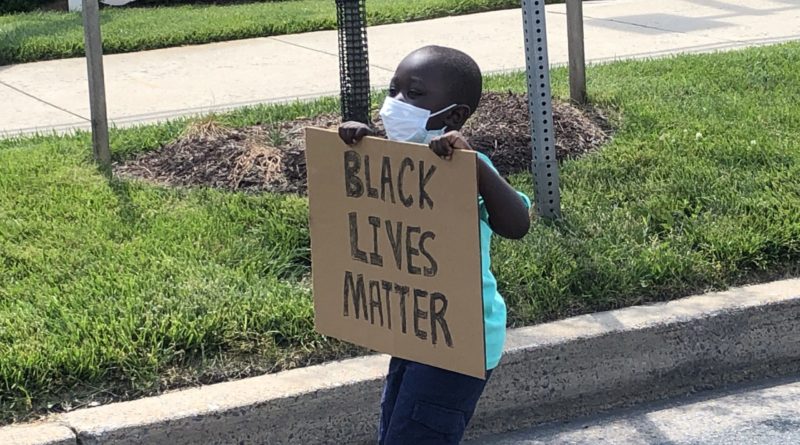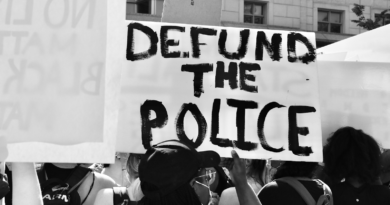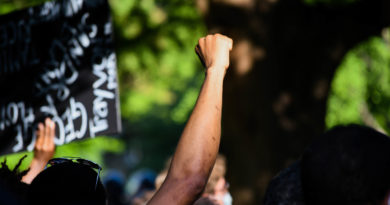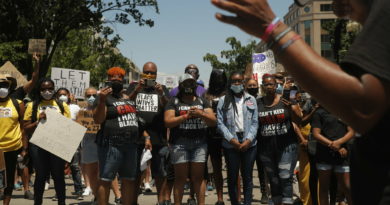My Experiences at a Black Lives Matter Protest
The sun beat down upon the masses of protesters congregated in Rockville’s Veterans’ Plaza and spilling out into the streets. Social distancing was difficult, but it seemed as though nearly all of the protesters were willing to rely solely on face masks to protect themselves, foregoing other safety measures, to protect black lives.
In the midst of fighting an insidious invisible enemy, thousands of protesters gathered to fight one becoming increasingly more visible: racism. People of all age groups, ethnicities, genders, and religious beliefs rallied to amplify black voices who for so long in this country have been crushed under the oppressive weight of slavery, Jim Crow laws, and a new manifestation of systemic racism less outwardly apparent.
The people gathered in that plaza were fighting against less easily condemnable and often normalized offenses like microaggressions; redlining; systematic economic disenfranchisement as a result of the opportunity and achievement gaps plaguing overcrowded minority-majority schools with compounding effects that ultimately result in a persistent canyon-sized wage gap between whites and blacks in a capitalist system that doesn’t always prioritize equity; and, of course, the disgusting pattern of police brutality that is a symptom of our country’s broken and unjust justice system. Because when you have a system that allows racist police officers to slip through the cracks–whether that’s because of insufficient psychological evaluations or inadequate implicit bias training, or when police officers are trained to react extraordinarily violently to a situation–the whole system is corrupted.
It is painfully clear that not all police officers understand this, thinking the status quo as it pertains to their careers is more sanctimonious than creating reforms that would save human lives, but it is reassuring to know that some do.
Standing in the same hot and humid environment with the protesters were several police officers. When I tried to interview an MCPD officer, he told me that he wished he could give me quotes, but that it was against their policy to give interviews at that kind of event. One of his fellow officers, however, shouted that they were only there to show they support us. I knew then that those were truly some of the good police officers, the ones who were angry at those like Derek Chauvin who tarnished the profession’s reputation and were right there with the protesters mentally, wishing and working for structural reform.
The atmosphere of support was radiant and contagious, fending off the exhaustion and misery the stifling heat tried to bring. There was a tent with food, water, and medical supplies with signs inviting people to take whatever they needed. Individual demonstrators brought their own wagons full of cool water and loads of snacks. Music played, people cheered for an invisible speaker, and claps rippled through the crowd. People had no idea what the music was for, why people were shouting and cheering and clapping, and who the speaker was or what they were saying (the speaker turned out to be SMOB Nate Tinbite). They were simply joining in, becoming one with the movement, showing their support in whichever way possible.
Even those who will never know what it’s like to be the victim of systemic racism showed their support, including MCPS juniors and triplets Maddie, Dana, and Valerie Graham.
“It’s like these rose-colored glasses were pulled off,” says Dana.
Maddie, who herself is a prominent climate justice activist and is experienced in organizing and attending protests, notes that she feels an obligation to use her white privilege to support and protect a fellow social justice movement. “We’re here to support black leadership in any way we can,” she says. “I have never personally feared for my activists’ safety when I’ve organized a protest because they’re largely white-led. So when you see the aggression and the cruelty of the police in these protests that are … as peaceful as mine … it’s disgusting. That’s when you realize you have to do anything you can to support these protesters [because] even in the protest world it’s not a level playing field.”
And it wasn’t just white people coming out to support the Black Lives Matter movement. Latinas held up signs reading, “Las vidas negras importan,” meaning, “Black lives matter” in Spanish. Mothers in hijabs were carrying signs that read, “When George Floyd called out for his mama, all mamas were called out.” An Asian woman held a sign that read, “Minorities stick together.” A Jewish couple held a sign with a Hebrew translation of “Black lives matter.”
It is this overwhelming sense of support and this intense response from all sorts of people, but especially white allies, that makes this iteration of the Black Lives Matter movement feel different and more potent. A young black woman named Jasmine, who came out to protest primarily for Breonna Taylor, who was murdered on her birthday, expresses gratitude for the support the movement is receiving.
“I just think it’s ridiculous that I have to fight to live in this country. It’s really tiring,” she says. “I think [the fight] is only really effective because a lot of people out here are being performative and they’re seeing all these white faces and maybe they’re finally believing us. We’re going to keep going until something happens.”
A young black man named Julian notes the differences in support for the movement this time around, too. He says, “I love how everything’s changing. The white people are teaching their kids about [the movement]. That’s never happened before.”
That was something I noticed at the protest, too: an abundance of children. With all the fear surrounding violence from rogue protesters and police, I found it strange that people would choose to bring their young kids out, but in talking to a woman who brought her four children to the protest, I came to understand what a valiant decision it was.
Mrs. L. Larson-Ravim says that it has been frustrating for her family to not be able to join the protests in downtown DC, but by protesting closer to home, they have been able to feel a little less helpless and have been able to provide their children with important life lessons. “They should be a part of this,” she says. “They need to be aware, they need to be standing up, they need to understand what’s happening to their friends and family members. My parents brought me out to protests when I was a kid. It’s a part of being a member of your community and a member of your world.”
And for black parents, for whom conversations about race and racial justice movements are so much more difficult, bringing their children out to these protests seems like passing down an unfortunate tradition of having to fight for what they are rightfully entitled to.
Ms. R. Reeves decided to bring her young daughter out to the demonstration for those reasons, and to make especially sure that the next generation of protesters, because there may need to be one, will make sure to highlight suppressed voices within oppressed communities. “We are black women and Breonna Taylor was a thing that happened. We wanted to make sure voices like Breonna Taylor’s are heard,” she says. “The BLM movement always prioritizes the rights of men and the stories of men and I feel it’s important that black women get acknowledged as well in this fight.”
She says that she has had some very hard conversations with her daughter over these past few days, some eliciting tears. “I don’t expect things to change in my lifetime or unfortunately hers, but it’s important for us to be able to make these types of stances,” she adds. “We voted on Tuesday, which is one of the most powerful tools I feel like we have, and [we can] also make sure that we get out and have our voices heard in a mass demonstration such as this, so here we are.”
After gathering at Veterans’ Plaza and listening to Tinbite’s speech, the massive crowd began its procession down Rockville Pike. A handful of chants were shouted along the three-mile march, including, “No justice, no peace, no racist police!” “Hands up, don’t shoot!” “I can’t breathe!” and “This is what democracy looks like!”
The last cry was especially poignant for me because that is a chant I recognized from when I covered climate protests back in the fall. The shared chants go to show the intersectionality of all these social justice movements and how everyone bands together to support the cause of the moment. For black lives’ sake, however, I and many others hope this movement lasts for more than a moment.
What was truly haunting, though, were the “Say their names” chants. Thousands of people shouted the names of George Floyd and Breonna Taylor, whose twenty-seventh birthday would have been that day. It was chilling how lives deceased seemed to be reborn in the voices of those chanting their names as rallying cries. It almost felt as though their spirits were walking among us.
It was then that I finally understood how healing and spiritual protesting can be, and how it is very easy to get swept up in the power of it all. Store owners and employees were pouring out of shops all down Rockville Pike to cheer and show their support. Drivers were honking car horns in support and holding up “Black Power” fists outside their car windows.
It was difficult for me as a high school journalist to remain objective during this event. I couldn’t help myself but kneel in solidarity at the last stop of the first leg of the march, where I found and interviewed Julian. He told me that he was very plainly fighting for equality.
“We’re not asking if a black guy robs something he doesn’t get punished,” he adds. “It’s just if he gets five years, why does a white person get less? It’s systematically just not fair and we’re tired of it. It’s in our hands to protest, but it’s up to the lawmakers and the people in charge to take a stand for what’s right.”
One can only hope that justice takes its course, that lawmakers heed Julian’s words, but the only way to ensure positive change is by protesting, posting on social media, signing petitions, donating to causes, and above all, voting. One day, I hope to live in a country where everyone understands that black lives matter.




